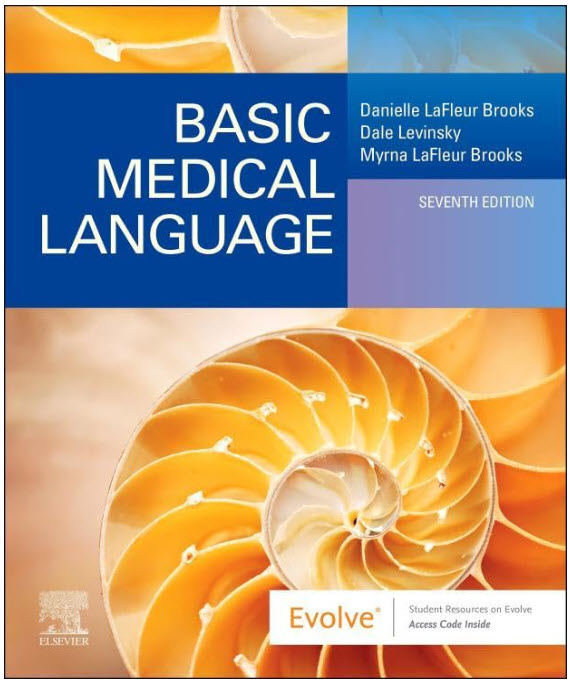Own a leading medical terminology textbook and use the free companion online course to enhance your language skills in the area of healthcare.


For over 25 years, the textbook Basic Medical Language has been used in the classroom to teach medical terminology.
Now, the authors are offering a course free with the purchase of the textbook.
Why Learn Medical Terminology
Learning the language of medicine, often referred to as medical terminology, offers numerous advantages:
1. Clarity and Precision: Medical terminology provides a standardized way for healthcare professionals to communicate complex concepts clearly and precisely. This is crucial for accurate diagnosis, treatment, and documentation.
2. Efficiency in Communication: Healthcare professionals can communicate efficiently with a common language, reducing the risk of misunderstandings and errors. This is particularly important in fast-paced medical environments.
3. Global Relevance: Medical terminology follows international standards, allowing healthcare professionals from different countries and backgrounds to communicate effectively. This is essential in a globalized world where medical teams often comprise individuals from diverse linguistic backgrounds.
4. Facilitates Learning and Collaboration: Understanding medical terminology makes it easier for students to grasp medical concepts and collaborate with peers and mentors. It provides a foundation for further learning and specialization in healthcare fields.
5. Interdisciplinary Communication: In healthcare settings, professionals from various disciplines, such as doctors, nurses, pharmacists, and technicians, need to collaborate. Knowledge of medical terminology facilitates seamless communication among these interdisciplinary teams.
6. Enhanced Patient Care: Patients may also benefit when healthcare professionals can explain diagnoses, treatments, and procedures using clear and understandable language. This fosters trust and encourages active participation in their own healthcare.
7. Documentation and Record-keeping: Medical terminology is essential for accurate documentation of patient records, including medical histories, diagnoses, treatments, and outcomes. Consistent terminology ensures that medical records are understandable and useful for future reference.
8. Career Advancement: Proficiency in medical terminology is often a requirement for many healthcare-related careers, including medical transcription, medical coding, healthcare administration, and clinical research. Acquiring this skill can enhance job prospects and career advancement opportunities.
Overall, learning the language of medicine is beneficial for healthcare professionals and patients, healthcare organizations, and the healthcare system as a whole.
To learn a spcialized language – and Medical Terminology is certainly specialized – promotes effective communication, improves patient care, and improves health outcomes.
Who Will Benefit from A Medical Terminology Online Course
A wide range of people will benefit by learning medical terminology with a medical terminology online course.
Healthcare Professionals: Doctors, nurses, pharmacists, medical assistants, therapists, technicians, and other healthcare providers can improve communication, collaboration, and patient care by mastering medical terminology.
Medical Students and Trainees: Learning medical terminology is essential for students pursuing careers in healthcare fields. It lays the foundation for understanding complex medical concepts and prepares them for clinical practice.
Administrative Staff in Healthcare: Medical receptionists, medical secretaries, healthcare administrators, and billing specialists need a solid grasp of medical terminology to document patient information accurately, schedule appointments, process insurance claims, and manage medical records.
Medical Transcriptionists and Coders: Professionals involved in medical transcription and coding tasks must be proficient in medical terminology to accurately transcribe dictations, assign appropriate codes for diagnoses and procedures, and ensure compliance with healthcare regulations.
Researchers and Clinical Trial Coordinators: Individuals conducting medical research or managing clinical trials benefit from understanding medical terminology to accurately interpret scientific literature, collect and analyze data, and communicate findings within the scientific community.
Patients and Caregivers: While not mandatory, learning basic medical terminology can empower patients and caregivers to understand medical conditions, treatment options, and healthcare instructions. This greater understanding of medical terminology can help to improve communication with healthcare providers and increase participation in healthcare decisions.
By equipping themselves with medical terminology knowledge, individuals in these roles can enhance their effectiveness, efficiency, and overall contribution to the healthcare system.
Learn More About This Fine Medical Terminology Online Course
- Electronic and paper flashcards
- Many varied exercises – choose which fits your learning style
- Online games, quizzes, videos, spelling, and pronunciation
- A fun quiz at the end of each lesson – you can repeat them as often as you like.

